- Home
- Stephen Hunter
Sniper's Honor Page 20
Sniper's Honor Read online
Page 20
Gershon activated his copy of Cain & Abel, pointed it at the authentification server for the South African Revenue Service, and waited. It wasn’t a long wait. In South Africa, a data entry clerk signed on, and Gershon walked into the system in his shadow; all the data that existed became visible to him.
He called up the enormous file on AMPLATS, reduced his frame set to transactions of a few days—on the assumption that Nordyne had bought fast and paid fast and therefore wanted shipment fast—and discovered that among the tonnes dispatched to car makers, the grams to jewelers and the pounds to oncological units, one shipment, AM43367, was dispatched to Nordyne Ceramics, located in Astrakhan, on the Volga River at the northeastern tip of the Caspian Sea, in Russia.
So who in Russia wanted $16 million in platinum, particularly when Russia was the world’s second largest producer of . . . platinum? It was the classic coals-to-Newcastle scenario, which made sense only if the point of the transaction was the secrecy of the transaction.
Suddenly there was another indicator pointing exactly to that one place: Astrakhan, which turned out to be a grimy seaport supported by petroleum sucked from under the Caspian, as well as sturgeon—the eggs were called caviar. It was a dreary Russian town of about a half a million luckless souls. But it turned out that he was able to intercept—another Cain & Abel transaction—an e-mailed request from a member of Intrusion Prevention Associates’ team to the home office in Grozny for an upgrade in per diem, because presumably the price of whores in Russia was higher than that in Chechnya.
So he had a security team, $16 million in platinum in a city in Russia. But where in that city?
One option: get beyond the firewall of Narimanovo Airport, see what cargo flights had arrived in Astrakhan from Johannesburg, what imports had been cleared, and where they had been routed to. Yes, but it was too far for the plane of choice—a Boeing 737 chartered to a Panamanian company called Hurricane Cargo—to fly straight from SA to RUS nonstop, so the plane would have had to stop for refueling, likely at the halfway point in Eritrea. Possibly Eritrea was listed as the point of origin on the Narimanovo documents. Sorting that would involve another level of search, which would involve time, time, and more time.
Instead, he decided to run recent industrial real estate transactions in Astrakhan and found them to be on the public record, so no clandestine penetration was involved. He guessed that if you were going to do something, anything, with 685 pounds of platinum, and if you had a security team standing by to protect the investment, you probably needed an old factory, and you needed to upgrade the joint with new fencing, TV surveillance cameras, sirens, location indicators, pressure-sensitive intrusion detectors and so forth. You needed electricity and water, some kind of fire prevention system. Most likely you needed equipment, and the equipment would pretty much reveal what it was that Nordyne was manufacturing.
You naughty boys, trying so hard to keep your games hidden. But Tata Gershon will find you in the end.
He got back to work.
CHAPTER 33
Yaremche
The Carpathians
THE PRESENT
The grazing wound in the side never bled. But the elbow did, presumably cut on the gunman’s breaking teeth. Swagger had washed and bandaged it but was surprised by the stiffness and bruising that seized his whole left arm and made the lengthy ride by Bumpa-Car to the mountain village the next day quite uncomfortable.
He didn’t tell Reilly about it, not wanting to alarm her. Nor did he mention Stronski’s claim about “The Americans.” It was another screwball, which threw everything out of whack, adding a new dimension of conspiracy that could lead anywhere or nowhere. But it weighed on him over the distance of the drive. He turned it over and over in his head, trying to define an American interest or angle in obscure events in a sliver of Ukraine in the middle of another nation’s war seventy years ago, about which most Americans knew nothing.
Now they had met at and checked in to a hotel, rested, and were standing on the walking bridge over the River Prut, just beyond where the water tumbled off the rocks and hit below with a roar and a splash, filling the air with mist. This clearly was not the exact bridge as crudely etched into the plate, since it was buttressed, sunk in concrete, and of strong metal itself, heavily engineered. But a bridge had stood here, and if the drawing was right, it was about here that Groedl was when Mili took her hopeless, doomed shot at him.
“Trying to figure out where the shot came from,” he said, looking around, trying to read the data of the place.
He saw the falls before him, the low bluffs of the river, and to the right, way off, a mountain slope. In the crude drawing on the plate, the officers next to the man were pointing more or less in that direction. But Bob didn’t buy it. Clearly the artist hadn’t seen the event but was re-creating it from an oral tale. The shot couldn’t have come from way out there.
“See, that’s way too far. A thousand yards. Not with any rifle she had could she have hit him from there. It has to be pretty close.”
He looked at the closer landforms. Surely the Germans controlled the banks of the river. They would have possibly crowded the villagers down there, on a little shelf of land just under the bridge, where Swagger had found the machine-gun shell.
He rotated 180 degrees, passing over the faux Ukraine village of souvenir booths where the old village itself had stood, and continued to examine the lay of the land. More riverbank, controlled by the Germans, and above it, on the left, a vast two-hundred-yard-tall slope of white pines that extended for another half mile from the bridge, perhaps half of it the chunk of land where the pines were somehow lighter, as they’d noticed before.
“She had to be there,” he said. “But I don’t see how they controlled it. She could get close enough over there to hit with any rifle. Wouldn’t need no scope. How’d they bluff her into shooting from so far out she had to miss?”
They stared at the slope rising above them.
“She had to be up there,” he said. “Notice anything?”
“Just a lot of mountain.”
“Look at the trees. The color, remember?”
In the sun, the demarcation between the lighter timber and the darker was clear.
“I’m getting something, I’ve got a feeling. Damn, nothing. But maybe—” He paused, thinking it over, and yes, it made solid sense.
“What is it?”
“The lighter green?”
“Yep.”
“It’s green because it’s new growth,” he said. “It’s been grown since 1944.”
“All right, new growth.”
“I think I know what they tried to do.”
CHAPTER 34
Above Yaremche
The Carpathians
MID-JULY 1944
It happened rarely enough, but sometimes there was good, deep sleep, dreamless. It exiled her fear, her fatigue, her predicament. It was pure bliss. Deep in the cave, buried in leaves, she finally found nourishment in sleep. It seemed to last forever, velvety and seamless, the utter pleasure of deep sleep and—
“What? What?”
“You must see this. Come, really, you must look at this.”
It was the Teacher. His voice was so strained that she did not bother to argue. Whatever it was, she had to see it.
It was the hour before the dawn. The night sky was like her sleep, velvety, dark, without depth or luster. But to the east, there was a strange glare.
“What is that? What is going on?”
“Come, see, it’s amazing.”
She followed him down the dark path through the forest, feeling the trees swaying in some kind of breeze, hearing the rush of the pine needles moving against each other, hearing the creaking and groaning as the heavy limbs moved reluctantly.
“Is it the offensive? Has the Red Army arrived?”
“No, something else. I don’t know what to make of it.”
He brought her to a promontory looking down through a notch between two mountain
s, and she recognized the landforms from the maps she’d studied, and knew she was looking into Yaremche. But the back slope of one of the mountains that obscured the village issued a glow above its crest that filled the sky, and even this high, this far, the acrid residue of smoke reached them. More strangely still, every now and then a tongue of flame could be seen in the darkness, though where it landed was behind the back slope.
“They’re burning it,” said the Teacher.
“Flammenwerfer-41s,” she said. “I’ve seen them before. They used them against us in Stalingrad. They’re systematically burning the slope of that mountain over the village, clearing it. But why?”
“That is what I meant to ask you. To do that much work that fast, they must have had to bring in every flamethrower in the area. Why? What on earth can it mean to them? And why do they do it now, when they know our troops are about to jump off and those weapons can halt or slow advances all up and down the line? Yet they gather them here for this madness. It makes no sense, does it, Sergeant Petrova?”
“You’re the intelligence assistant, Teacher. You tell me.”
“I have no idea. Well, except—”
“Go on.”
“They fear you.”
“What?”
“They have not yet caught you, and it drives them mad with fear. They do not know if you have a new rifle. Thus, to be safe, they denude the mountain of its forest cover surrounding a town. The point is to deny the White Witch cover from which to fire. But why would she come to this town, in this zone?”
“I can think of only one reason.”
“And that is?”
“Groedl himself, for some reason, will soon be in this town.’ ”
“How close do you need to be?”
“With an infantry rifle, I’d need to be within two hundred yards, and there’s no way I’m going to walk down a barren slope of burned hillside with a nice long rifle to within two hundred yards.”
“No, they’ll massacre you.”
She tried to think of herself making a long shot without telescopic sights. It was—impossible. At over three hundred yards, he’d be a speck, a tiny dot. Worse, she’d have to hold over him, and he’d be gone, hidden behind the wedge of the front sight, and she’d have nothing to index to, unable to read the distance. The wind would play, the humidity would play, every tremble in every fiber in her body would play.
You have to do it anyway.
It’s madness. It’s death. It’s folly.
But she was caught. She felt the only way to prove to an NKVD that concealed a traitor that she was not herself a traitor was to make the kill. But the range was too far, the rifle not precise enough now that the Germans had scorched the earth.
“I have to shoot from the edge of the burned zone,” she said.
“It’s too far. I see, it’s a trap. That’s where they want you to shoot from. Men will be there.”
“It doesn’t matter.”
“You don’t even have a rifle.”
“I will get a rifle. Tomorrow that is our mission.”
“No, tomorrow we scrounge for food, because if we don’t find it, the day after, we will be too weak to find a rifle.”
* * *
The next day they took a chance. They had to eat. She was a mile or so away from the cave, in a nondescript glade of trees given not so much to the high white pines but more to spruce and juniper and the groundcover called snowball. It was in precincts such as these where the fungus thrived, though it took a good eye to spot it nestled in shade in the undergrowth or at the base of trees away from sun. She looked for a brown thing with black edging and fins along its stalk called a honey mushroom, which the Peasant had told her was edible. She had a sample and rooted like a pig, probing and sniffing for the dead white flesh of the things. But in one second, the world changed.
She melted. She slid down and, on the ground, squirmed as gently as possible deeper in the tangles and the tendrils of the snowball. She felt her heart begin to hammer. It was . . . what? An odd sound, a wisp of odor, a peripheral clue that flew straight to her subconscious. She lay, still as death.
Slowly they emerged. No, they had not seen her. A roaming patrol, their own woodcraft exceedingly high, they were slipping through the white pines, hunting.
She had not seen SS men since Kursk. She lay motionless in the brush as the hunched, tense soldiers moved through. They were bent double, ready for action, camouflaged in the dapples of the summer forest, their weapons black and held easily in hand, unslung for fast action. She heard them shout to each other, though in Serbian, not German, and it was clear they were highly professional, good at quiet movement, men well experienced in the stealth of war.
A trickle of sweat came down her neck, then another and another. She could not move to squelch the discomfort, but instead tried to focus on it, reduce it to components, the wetness, the subversive irritation, the irrationality of her need to rub it hard and make it stop annoying her. Then a hundred other tiny infractions of order began to tickle her supine body, the pain of abrasions, the dry twitch of an itch, the further tracking of sweat, the nasal dryness of her reduced breathing, the agony of a finger trapped at an odd angle under her hand, which was in its place trapped under her body, the hum of small insects fluttering at her ears, drawn to her by the odor of that sweat, the brush of their landing, the miniature sting of their bites, not in themselves annoying but, as they multiplied in time, truly uncomfortable. To move would be to die.
Loud crushing. Boots trampled brush so close at hand. They raised dust, which drifted, floated to her dry nostrils, and settled their veil of grit within. More kicking; suddenly they were before her, black hobnailed things, well used, well worn, extremely comfortable to their wearer. He stopped, and though blurry through the slitted vision of her eyelids—she was afraid to close them, too much noise!—she recognized repose as the fellow stopped to pluck something from his pouch, diddle with it, adjust it, make preparations. A zip came from above, followed by the stench of sulfur in the wind, followed by the sound of a hard suck, followed by the odor of pipe tobacco as it took full ignition.
His right boot was less than a foot from her. He sucked hard on his pipe, enjoyed the mellow blast of the burning tobacco, and exhaled a cloud of smoke, which drifted over her like the raiments of sackcloth. The SS man was taking a nice little break from his hunt, presumably using the quiet to give his eyes full freedom to roam, to search for telltale sign, a track, a fractured bough, a scrape, whatever, that would lead him to his quarry.
His boot was so close. She remembered the SS boots at Kursk, as she had seen so many. Involuntarily the memories, which she had pressed so hard to forget, came over her as if in a sudden tide from her subconscious, where she had tried to lock them away.
It was called the Special Purpose Detachment, an ad hoc emergency assemblage of sharpshooters from all over the southern front, not just vets of Stalingrad but of Rostov, Sebastopol, Kharkov, Kiev, wherever the sniper had practiced his trade. Though most, like Mili, were army, this was strictly an NKVD operation. It was something only NKVD would think up.
“Tomorrow,” said the commissar, “July twelfth, two great tank armies will clash. Look at the map, comrades, and see that it is ordained. The Second SS Panzer Corps will send eight hundred Panzer IVs and Tiger Is and we will greet them with fifteen hundred T-34s from the Fifth Guards Tank Army. It will be the greatest tank battle in history, and you are privileged to fight in it.”
They were in a village called Prokhorovka, in the southern aspect of a salient that the German armored forces were trying to pinch off, then destroy, from two directions. Though a terrible melee on the ground, the battle was simple: the Germans would meet up, cutting off and surrounding the salient and turning it into an encirclement, then destroy the trapped hundreds of thousands; or they would not. It was up to the tankers of the 5th Guards to prevent that.
“At 0400 you will be distributed among the tanks as they rally and begin to move
to the fields outside the village. There will be five of you per tank. You will ride them into battle, as our tank riders have done so heroically throughout the war. At a certain moment after daybreak, you will engage the German panzers. Those of you who survive the transit through the German artillery barrage will wait until the two tank armies are fully involved and then peel off and find some sort of shooting position, behind a ruined vehicle, in a copse of trees, in a scruff of vegetation, at the lip of a shell crater.
“You will see before you a field of ruin as the tanks begin to destroy each other on a massive scale. You have a specific job. You will note that when a German tank is hit and brought to a stop, it may or may not burn. That depends on the hit and a thousand other factors. If it does not burn, its crew will scamper out the hatch and head on foot back to German lines to acquire another tank and continue the fight. Your job, snipers, is to kill these men before they make it back. Shoot them down without mercy! Punish them for their cruelties, their atrocities, the evil of their invasion of the motherland, their destruction of our villages and towns. That is your holy mission.
“I have a warning as well. As I said, the German tanks will burn or not burn, depending on the placement of the shell. If the tanks burn, oftentimes their crew or some of their crew will make it out. These men will be aflame. Perhaps you have seen as much in your experience, and you know that watching a man burn to death is no easy thing.
“But your heart must be steel. You would not be human if you didn’t feel the impulse to put a mercy shot into that screaming, dancing apparition and end his agony. You are not permitted, under pain of execution, to shoot the flamers. You must concentrate on unwounded Germans. You are not permitted to waste time and ammunition on our own flamers. Order 270 will apply tomorrow on the killing ground. Remember: waste not one bullet on mercy.”

 Point of Impact
Point of Impact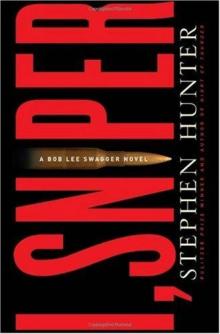 I, Sniper
I, Sniper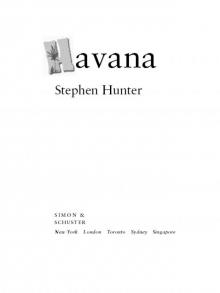 Havana
Havana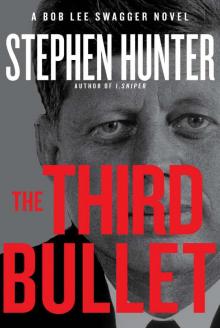 The Third Bullet
The Third Bullet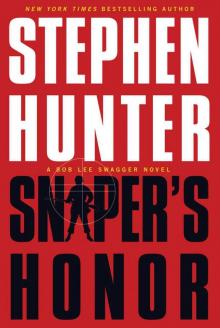 Sniper's Honor: A Bob Lee Swagger Novel
Sniper's Honor: A Bob Lee Swagger Novel Dirty White Boys
Dirty White Boys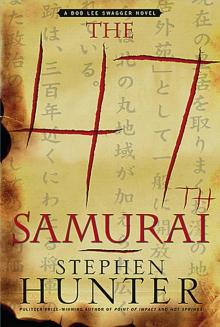 The 47th Samurai
The 47th Samurai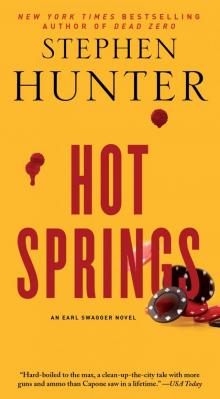 Hot Springs
Hot Springs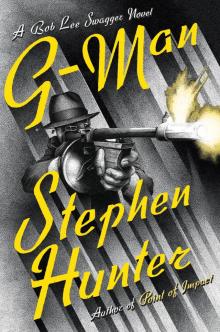 G-Man
G-Man Black Light
Black Light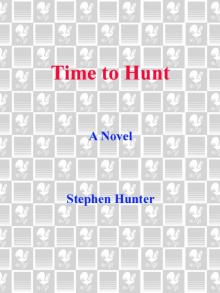 Time to Hunt
Time to Hunt The Day Before Midnight
The Day Before Midnight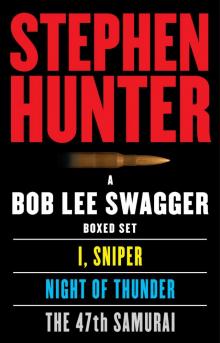 A Bob Lee Swagger Boxed Set
A Bob Lee Swagger Boxed Set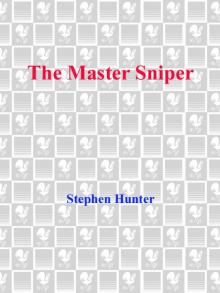 The Master Sniper
The Master Sniper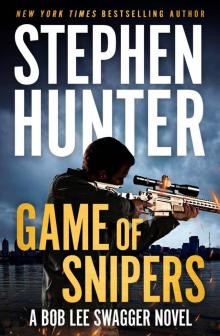 Game of Snipers
Game of Snipers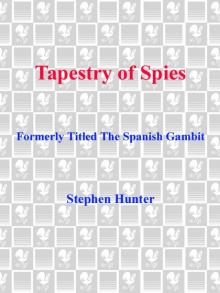 Tapestry of Spies
Tapestry of Spies Citadel
Citadel The Second Saladin
The Second Saladin Stephen Longacre's Greatest Match
Stephen Longacre's Greatest Match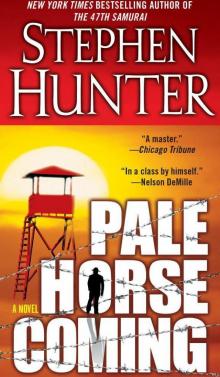 Pale Horse Coming
Pale Horse Coming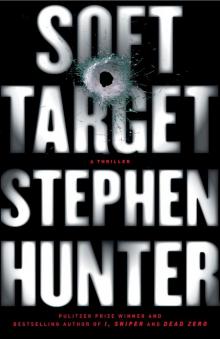 Soft Target
Soft Target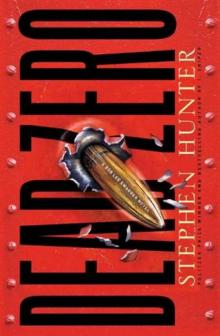 Dead Zero
Dead Zero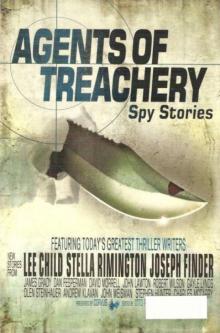 Casey at the Bat
Casey at the Bat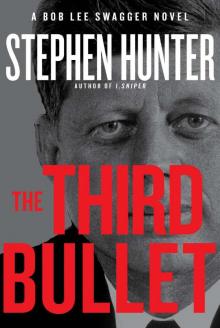 The Third Bullet bls-8
The Third Bullet bls-8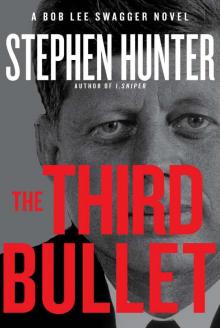 The Third Bullet: A Bob Lee Swagger Novel
The Third Bullet: A Bob Lee Swagger Novel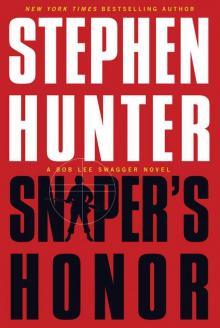 Sniper's Honor
Sniper's Honor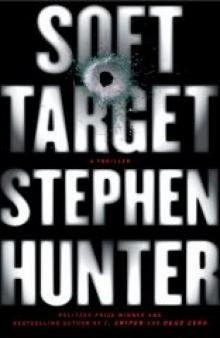 Soft target rc-1
Soft target rc-1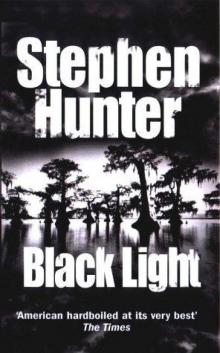 Black Light bls-2
Black Light bls-2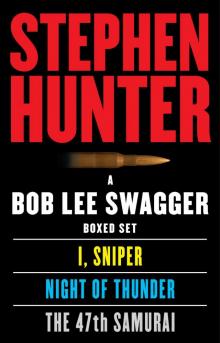 A Bob Lee Swagger eBook Boxed Set: I, Sniper, Night of Thunder, 47th Samurai
A Bob Lee Swagger eBook Boxed Set: I, Sniper, Night of Thunder, 47th Samurai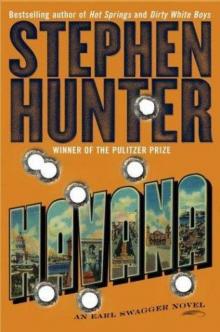 Havana es-3
Havana es-3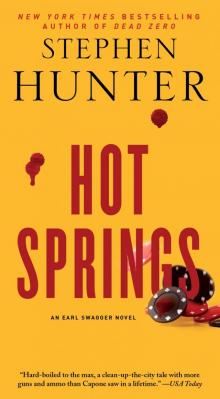 Hot Springs (Earl Swagger)
Hot Springs (Earl Swagger)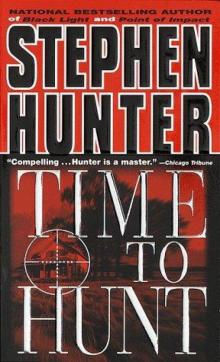 Time to Hunt bls-1
Time to Hunt bls-1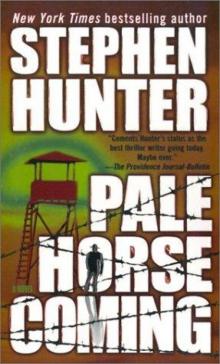 Pale Horse Coming es-2
Pale Horse Coming es-2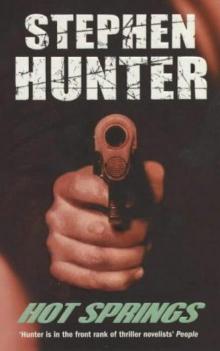 Hot Springs es-1
Hot Springs es-1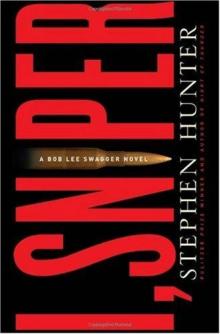 I, Sniper: A Bob Lee Swagger Novel
I, Sniper: A Bob Lee Swagger Novel